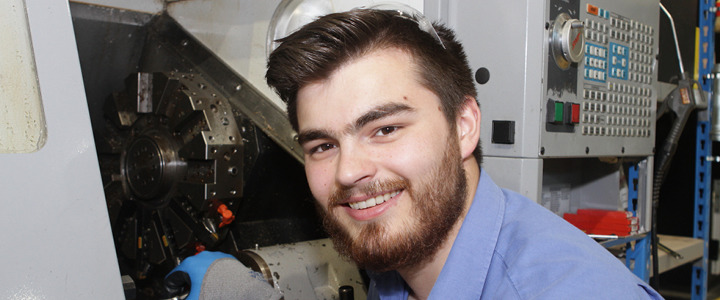Testing time for apprentice helps the AMRC expand its services for exporters
15 December 2016Specialists from the University of Sheffield Advanced Manufacturing Research Centre with Boeing are helping Sheffield based steel fabricator A K Orme & Sons export strengthening rings to China after expanding their testing capabilities.
The AMRC’s Advanced Structural Testing Centre is also using its new capabilities to support projects developing new steels for aircraft landing gear and investigating the quality of recycled metal powder.
Advanced Structural Testing Centre (ASTC) head Phil Spiers says the expansion is the result of collaboration between different AMRC departments and the skills of ASTC apprentice Edward Allen.
“Our tensile testing services were limited by the need to have test pieces manufactured elsewhere,” says Spiers.
“It was taking a long time to turn them around. Ed was in his final year as an apprentice, so we got him to refurbish an old CNC machine we had been given, which allows us to make test pieces ourselves.
“We have also invested in a bench top CNC machine which can make even smaller test pieces and, while some of us in the Testing Centre have machining experience, none of us has used CNC machines, so Ed is now going to teach us.
“He’s done a really good job and it means we can get on with the job of supporting local businesses, giving them a far faster turnaround.”
Refurbishing and recommissioning the old CNC machine was quite a challenge, not least because it had stood idle and full of old oil for years, but that wasn’t Edward Allen’s only challenge.
A K Orme’s Chinese contract involves creating rings by cutting steel rods to length, bending them and welding the ends together. The Arundel Street company’s client wanted the weld strength measuring, which meant cutting the welded section out of the ring and machining it so that the tensile strength could be measured perpendicular to the weld surface.
“I had to cut the sample to length and drill the centres in the right place, which meant making accurate jigs” says Edward Allen.
“Milling metal jigs from steel would have taken weeks and been expensive. Fortunately, I was able to design the jigs on our CAD systems and feed the data into the AMRC Design and Prototyping Centre’s Additive Manufacturing machines to rapidly make polymer jigs.”
More shared AMRC resources came into play when Allen used the AMRC National Metals Technology Centre’s highly accurate cut off machine, before transferring samples from the rings to the recently refurbished CNC machine.
“I had to program the machine the old school way, putting the code in by hand, but the experience was really worthwhile,” says Allen.
The experience set him up for the next challenge – making test samples the size of a little finger from sections he cut from a finished landing gear component as wide as a human thigh.
“I’m really pleased with the results of expanding our capabilities,” said Phil Spiers.
“It shows we are still doing what we were set out to do when the AMRC was founded – working in collaboration to maximise what we can do to support local companies in global markets.
“Now, we are looking at how Orme might use Non-Destructive Testing (NDT) to check the welds on the rings. Ultimately, that will do us out of a job, but we don’t mind that if it is a better solution for the client.”

